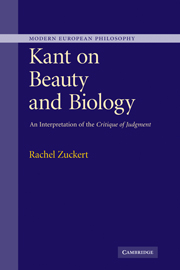Book contents
- Frontmatter
- Contents
- Acknowledgments
- Note on citations
- Introduction
- 1 The problem: The unity of the diverse
- 2 Reflective judgment and its principle: Preliminary remarks
- Part I Teleological judgment
- 3 The analytic of teleological judgment: Purposive unity is the “highest formal unity”
- 4 A merely subjective principle: Time and the “peculiarities” of our intellects
- Part II Aesthetic judgment
- Conclusion
- Bibliography of works cited
- Index
4 - A merely subjective principle: Time and the “peculiarities” of our intellects
from Part I - Teleological judgment
Published online by Cambridge University Press: 22 September 2009
- Frontmatter
- Contents
- Acknowledgments
- Note on citations
- Introduction
- 1 The problem: The unity of the diverse
- 2 Reflective judgment and its principle: Preliminary remarks
- Part I Teleological judgment
- 3 The analytic of teleological judgment: Purposive unity is the “highest formal unity”
- 4 A merely subjective principle: Time and the “peculiarities” of our intellects
- Part II Aesthetic judgment
- Conclusion
- Bibliography of works cited
- Index
Summary
Kant argues, as we have seen, that in order to understand what is specific to organisms we must judge them teleologically; we may understand the unity of heterogeneous parts as such in an organism only by employing the principle of purposiveness. Kant also, however, pervasively qualifies these claims. Teleological judgment is, Kant claims, merely reflective, not determinative, judgment; the principle of natural purposiveness may be necessary in order to judge organisms, but it does not “explain” their behavior (v:360). This principle is not an objective principle that characterizes objects, but merely a subjective principle, a maxim or a “critical” concept “lawful” only in relation to “our cognitive faculties,…the subjective conditions for thinking,” only for reflective judgment (v:395). Indeed, Kant concludes his Dialectic of Teleological Judgment by claiming – in stark contrast to his arguments concerning the necessity of teleological judgment of organisms – that we have an “obligation to give a mechanical explanation of all products and events in nature, even the most purposive, as far as it is in our capacity to do so.”
Kant suggests that these qualifications derive from the relationship of the principle of purposiveness to the “peculiar” character (Eigentümlichkeit) of our intellects. Teleological judgment is merely reflective, the principle of (material natural) purposiveness merely regulative, because such judgment is necessary “only for us”: because of the peculiar nature of human, discursive intellects, we must judge organisms teleologically, but this does not mean that this principle does, objectively, apply to organisms or explain their possibility (v:399–400).
- Type
- Chapter
- Information
- Kant on Beauty and BiologyAn Interpretation of the 'Critique of Judgment', pp. 130 - 170Publisher: Cambridge University PressPrint publication year: 2007



